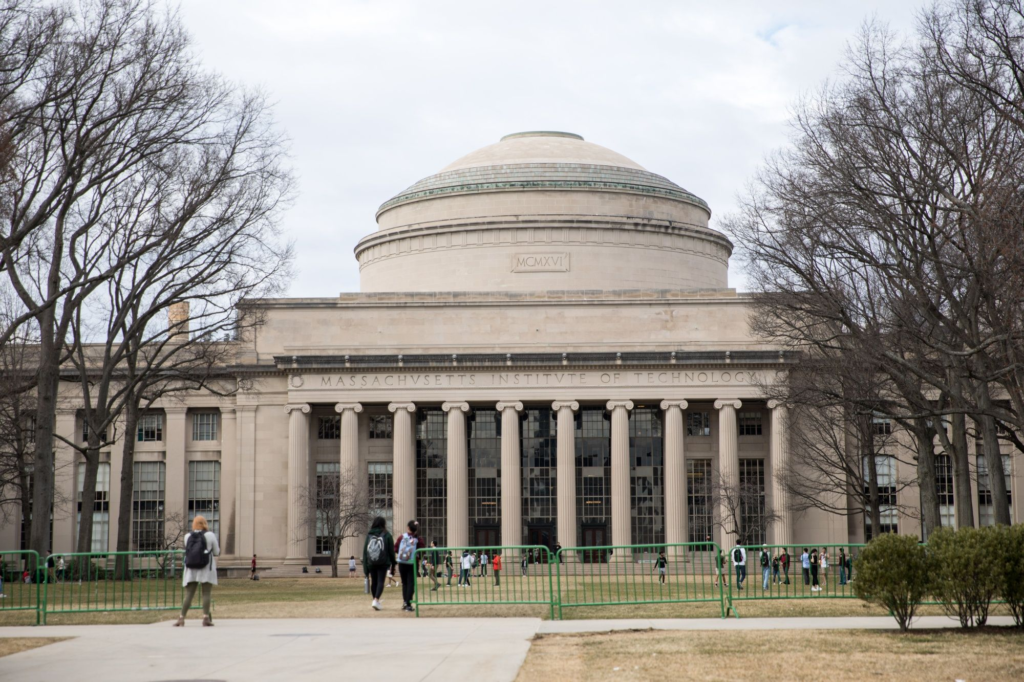What makes a university stand out in the world of engineering? In today’s fast-changing world of technology, engineering is crucial in shaping our future. Engineers lead the way in creating new innovations and solving big global problems. Studying engineering at a top-ranked university can open many doors to exciting careers and give students the knowledge and skills they need to make a real difference.
When looking at the best engineering universities, several key factors matter. These include the university’s research output, showing its dedication to advancing scientific knowledge and innovation. The reputation among academic peers and employers is also important, as it reflects the quality of education and the success of graduates. Additionally, employability rates and how well alumni do in their careers indicate how well the university prepares students for the workforce.
Top 10 Engineering Universities in the World
Top Engineering Universities in the United States
1. Massachusetts Institute of Technology (MIT)
The Massachusetts Institute of Technology (MIT) is widely recognized as a leader in engineering education and research. Known for its cutting-edge innovation and rigorous academic programs, MIT consistently ranks at the top of global university rankings. The institute boasts a strong emphasis on practical, hands-on learning and offers numerous opportunities for students to engage in groundbreaking research. Graduates from MIT are highly sought after by employers worldwide, thanks to their strong technical skills and problem-solving abilities.

| Massachusetts Institute of Technology (MIT) | |
|---|---|
| Rankings | #1 in Engineering (QS World University Rankings 2023) |
| Acceptance Rate | 7% (Undergraduate) |
| Required Exams | SAT or ACT, GRE (for graduate programs) |
| Average GRE Scores | Verbal: 162, Quantitative: 168, Analytical Writing: 4.8 |
| Tuition Fees (2022-2023) | $53,790 (Undergraduate), $53,720 (Graduate) |
| Estimated Living Expenses | $18,972 (On-campus housing and meals) |
| Average Starting Salary | $91,000 (Undergraduate), $111,000 (Graduate) |
| Notable Engineering Programs | Electrical Engineering, Mechanical Engineering, Aerospace/Aeronautical Engineering, Computer Science, Chemical Engineering |
2. Stanford University:
Stanford University is renowned for its exceptional engineering programs and its close ties to Silicon Valley, the heart of technological innovation. The university offers a dynamic and interdisciplinary approach to engineering education, encouraging collaboration across different fields. Stanford’s engineering faculty and students are involved in pioneering research that addresses some of the world’s most pressing challenges. The university’s strong reputation and extensive alumni network ensure that its graduates are well-prepared and highly valued in the job market.

| Stanford University | |
|---|---|
| Rankings | #3 in Engineering (QS World University Rankings 2023) |
| Admission Rate | 5.1% (Undergraduate) |
| Required Exams | SAT or ACT, GRE (for graduate programs) |
| Average GRE Scores | Verbal: 162, Quantitative: 168, Analytical Writing: 4.3 |
| Tuition Fees (2022-2023) | $53,529 (Undergraduate), $54,315 (Graduate) |
| Estimated Living Expenses | $18,964 (On-campus housing and meals) |
| Average Starting Salary | $88,000 (Undergraduate), $108,000 (Graduate) |
| Notable Engineering Programs | Computer Science, Electrical Engineering, Mechanical Engineering, Bioengineering, Civil and Environmental Engineering |
3. University of California, Berkeley
The University of California, Berkeley is known for its top-tier engineering programs and strong emphasis on research and innovation. As a leading public university, Berkeley provides students with access to world-class faculty and state-of-the-art facilities. The College of Engineering at Berkeley is involved in cutting-edge research across various fields, from renewable energy to artificial intelligence. Berkeley’s location in the San Francisco Bay Area offers students unique opportunities for internships and collaborations with leading tech companies. Graduates from Berkeley are highly respected and in demand for their technical expertise and innovative thinking.

| University of California, Berkeley | |
|---|---|
| Rankings | #5 in Engineering (QS World University Rankings 2023) |
| Admission Rate | 16.8% (Undergraduate) |
| Required Exams | SAT or ACT, GRE (for graduate programs) |
| Average GRE Scores | Verbal: 160, Quantitative: 167, Analytical Writing: 4.5 |
| Tuition Fees (2022-2023) | $14,254 (In-state, Undergraduate), $43,176 (Out-of-state, Undergraduate), $14,594 (In-state, Graduate), $30,134 (Out-of-state, Graduate) |
| Estimated Living Expenses | $35,300 (On-campus housing and meals) |
| Average Starting Salary | $75,000 (Undergraduate), $95,000 (Graduate) |
| Notable Engineering Programs | Electrical Engineering and Computer Sciences, Mechanical Engineering, Civil and Environmental Engineering, Bioengineering, Materials Science and Engineering |
4. California Institute of Technology (Caltech)
The California Institute of Technology (Caltech) is renowned for its strong focus on science and engineering. Caltech’s engineering programs are highly respected for their rigorous curriculum and emphasis on research. Students at Caltech benefit from small class sizes and close interactions with faculty, who are leaders in their fields. The institute is home to numerous cutting-edge research facilities and projects, often in collaboration with NASA and other major organizations. Caltech graduates are known for their exceptional problem-solving skills and are highly sought after by employers in both academia and industry.

| California Institute of Technology (Caltech) | |
|---|---|
| Rankings | #6 in Engineering (QS World University Rankings 2023) |
| Admission Rate | 6.9% (Undergraduate) |
| Required Exams | SAT or ACT, GRE (for graduate programs) |
| Average GRE Scores | Verbal: 163, Quantitative: 170, Analytical Writing: 4.6 |
| Tuition Fees (2022-2023) | $57,638 (Undergraduate), $57,638 (Graduate) |
| Estimated Living Expenses | $20,208 (On-campus housing and meals) |
| Average Starting Salary | $90,000 (Undergraduate), $105,000 (Graduate) |
| Notable Engineering Programs | Aerospace Engineering, Electrical Engineering, Mechanical Engineering, Applied Physics, Computer Science |
Top Engineering Universities in Europe
5. University of Cambridge (UK)
The University of Cambridge in the United Kingdom is esteemed worldwide for its excellence in engineering education and research. With a history dating back over 800 years, Cambridge offers a rich academic environment and state-of-the-art facilities. Its engineering faculty is known for pioneering advancements in fields such as aerospace, biomedical engineering, and sustainable energy. Cambridge’s strong emphasis on interdisciplinary collaboration encourages students to explore innovative solutions to global challenges. Graduates from Cambridge are highly regarded globally for their technical expertise and leadership capabilities, making them sought after by top employers and research institutions.

| University of Cambridge | |
|---|---|
| Rankings | #3 in Engineering (QS World University Rankings 2023) |
| Admission Rate | 21% (Undergraduate) |
| Required Exams | A-Levels or equivalent, GRE (for graduate programs) |
| Average GRE Scores | Verbal: 160, Quantitative: 168, Analytical Writing: 4.5 |
| Tuition Fees (2022-2023) | £9,250 (Undergraduate, UK/EU), £24,768 (Undergraduate, International), £12,298 (Graduate, UK/EU), £27,738 (Graduate, International) |
| Estimated Living Expenses | £12,000 – £15,000 (On-campus housing and meals) |
| Average Starting Salary | £30,000 – £40,000 (Undergraduate), £45,000 – £55,000 (Graduate) |
| Notable Engineering Programs | Engineering, Chemical Engineering, Computer Science, Electrical and Information Sciences, Mechanics, Materials Science |
6. ETH Zurich (Switzerland)
ETH Zurich, located in Switzerland, is renowned for its world-class engineering programs and cutting-edge research initiatives. As one of Europe’s leading technical universities, ETH Zurich fosters a culture of innovation and interdisciplinary collaboration. The university boasts state-of-the-art facilities and attracts top faculty and students from around the globe. ETH Zurich’s strong ties with industry and research institutions provide students with valuable opportunities for practical experience and networking. Graduates from ETH Zurich are highly respected for their technical proficiency and problem-solving abilities, making them highly sought after in both academia and industry worldwide.

| ETH Zurich | |
|---|---|
| Rankings | #6 in Engineering (QS World University Rankings 2023) |
| Admission Rate | 26% (Undergraduate) |
| Required Exams | Swiss Matura or equivalent, GRE (for graduate programs) |
| Average GRE Scores | Verbal: 155, Quantitative: 165, Analytical Writing: 4.2 |
| Tuition Fees (2022-2023) | CHF 1,272 (Undergraduate), CHF 1,272 (Graduate) |
| Estimated Living Expenses | CHF 20,000 – CHF 25,000 (On-campus housing and meals) |
| Average Starting Salary | CHF 75,000 – CHF 90,000 (Undergraduate), CHF 90,000 – CHF 110,000 (Graduate) |
| Notable Engineering Programs | Mechanical Engineering, Electrical Engineering and Information Technology, Computer Science, Civil Engineering, Materials Science and Engineering |
7. Imperial College London (UK)
Imperial College London, situated in the heart of the UK’s capital, is renowned for its excellence in engineering and scientific research. The college offers a comprehensive range of engineering disciplines, from mechanical and electrical engineering to bioengineering and computing. Imperial’s strong emphasis on innovation and entrepreneurship nurtures students’ creativity and problem-solving skills. Its close collaborations with industry leaders and cutting-edge research facilities provide students with practical experience and opportunities to contribute to groundbreaking projects. Graduates from Imperial College London are highly regarded for their technical expertise and leadership qualities, making them valuable assets in the global job market and academia alike.

| Imperial College London | |
|---|---|
| Rankings | #8 in Engineering (QS World University Rankings 2023) |
| Admission Rate | 15.4% (Undergraduate) |
| Required Exams | A-Levels or equivalent, GRE (for graduate programs) |
| Average GRE Scores | Verbal: 158, Quantitative: 166, Analytical Writing: 4.3 |
| Tuition Fees (2022-2023) | £9,250 (Undergraduate, UK/EU), £32,000 (Undergraduate, International), £14,000 – £37,000 (Graduate, UK/EU), £34,000 – £44,000 (Graduate, International) |
| Estimated Living Expenses | £15,000 – £20,000 (On-campus housing and meals) |
| Average Starting Salary | £35,000 – £45,000 (Undergraduate), £50,000 – £60,000 (Graduate) |
| Notable Engineering Programs | Electrical and Electronic Engineering, Mechanical Engineering, Civil and Environmental Engineering, Aeronautics, Computing |
8. Technical University of Munich (Germany)
The Technical University of Munich (TUM) is a prestigious institution known for its excellence in engineering and technology education. Located in Germany, TUM offers a wide range of engineering programs that emphasize both theoretical knowledge and practical application. The university’s strong research focus and state-of-the-art facilities enable students to engage in innovative projects across various disciplines, including automotive engineering, computer science, and environmental engineering. TUM’s close collaborations with industry and international partners provide students with valuable opportunities for internships and research placements. Graduates from TUM are highly regarded for their technical proficiency and problem-solving skills, making them sought after by employers worldwide.

| Technical University of Munich | |
|---|---|
| Rankings | #50 in Engineering (QS World University Rankings 2023) |
| Admission Rate | 25% (Undergraduate) |
| Required Exams | Abitur or equivalent, GRE (for graduate programs) |
| Average GRE Scores | Verbal: 153, Quantitative: 162, Analytical Writing: 4.0 |
| Tuition Fees (2022-2023) | €258 (Undergraduate), €258 (Graduate) |
| Estimated Living Expenses | €10,000 – €12,000 (On-campus housing and meals) |
| Average Starting Salary | €45,000 – €55,000 (Undergraduate), €60,000 – €70,000 (Graduate) |
| Notable Engineering Programs | Mechanical Engineering, Electrical and Computer Engineering, Civil Engineering, Aerospace Engineering, Materials Science and Engineering |
Top Engineering Universities in Asia
9. Tsinghua University (China)
Tsinghua University in China is renowned for its strong emphasis on engineering and technological innovation. As one of China’s top universities, Tsinghua offers a wide array of engineering disciplines, including civil engineering, mechanical engineering, and electronic engineering. The university’s commitment to cutting-edge research and development is evident through its numerous state-of-the-art laboratories and research centers. Tsinghua’s strategic location in Beijing, a hub of technological advancement, provides students with unique opportunities for collaboration with industry leaders and government agencies. Graduates from Tsinghua University are highly sought after for their technical expertise and leadership potential, contributing significantly to China’s rapidly evolving engineering landscape and beyond.

| Tsinghua University | |
|---|---|
| Rankings | #16 in Engineering (QS World University Rankings 2023) |
| Admission Rate | 2.9% (Undergraduate) |
| Required Exams | Gaokao or equivalent, GRE (for graduate programs) |
| Average GRE Scores | Verbal: 154, Quantitative: 166, Analytical Writing: 3.8 |
| Tuition Fees (2022-2023) | ¥36,800 (Undergraduate), ¥36,800 (Graduate) |
| Estimated Living Expenses | ¥60,000 – ¥80,000 (On-campus housing and meals) |
| Average Starting Salary | ¥150,000 – ¥200,000 (Undergraduate), ¥200,000 – ¥250,000 (Graduate) |
| Notable Engineering Programs | Computer Science and Technology, Electrical Engineering, Mechanical Engineering, Civil Engineering, Materials Science and Engineering |
10. National University of Singapore (NUS)
The National University of Singapore (NUS) stands out as a leading institution for engineering education in Asia and globally. Known for its strong focus on research and innovation, NUS offers a diverse range of engineering disciplines, from biomedical and chemical engineering to computer and electrical engineering. The university’s state-of-the-art facilities and world-class faculty facilitate cutting-edge research and practical learning experiences for students. NUS’s strategic partnerships with industry and government organizations provide students with valuable opportunities for internships, collaborations, and entrepreneurial ventures. Graduates from NUS are highly respected for their technical competence and leadership skills, contributing to advancements in engineering and technology on a global scale.

| National University of Singapore | |
|---|---|
| Rankings | #9 in Engineering (QS World University Rankings 2023) |
| Admission Rate | 25% (Undergraduate) |
| Required Exams | A-Levels or equivalent, GRE (for graduate programs) |
| Average GRE Scores | Verbal: 156, Quantitative: 165, Analytical Writing: 4.1 |
| Tuition Fees (2022-2023) | SGD $8,800 – $12,200 (Undergraduate, Singaporean), SGD $34,800 – $39,800 (Undergraduate, International), SGD $14,200 – $24,200 (Graduate, Singaporean), SGD $25,200 – $37,200 (Graduate, International) |
| Estimated Living Expenses | SGD $12,000 – SGD $15,000 (On-campus housing and meals) |
| Average Starting Salary | SGD $3,800 – SGD $4,500 (Undergraduate), SGD $5,000 – SGD $6,500 (Graduate) |
| Notable Engineering Programs | Computer Science, Electrical and Computer Engineering, Civil and Environmental Engineering, Mechanical Engineering, Materials Science and Engineering |
11. The University of Tokyo (Japan)
The University of Tokyo (UTokyo) is renowned worldwide for its excellence in engineering education and research. As Japan’s leading university, UTokyo offers a comprehensive range of engineering disciplines, including mechanical engineering, civil engineering, and information technology. The university’s commitment to innovation is evident through its advanced research facilities and interdisciplinary approach to tackling global challenges. UTokyo’s strong partnerships with industry leaders and international collaborations provide students with opportunities to gain practical experience and contribute to groundbreaking projects. Graduates from UTokyo are highly regarded for their technical expertise and problem-solving abilities, making them valuable contributors to Japan’s technological advancement and global engineering community.

| The University of Tokyo | |
|---|---|
| Rankings | #24 in Engineering (QS World University Rankings 2023) |
| Admission Rate | 28.8% (Undergraduate) |
| Required Exams | National Center Test or equivalent, GRE (for graduate programs) |
| Average GRE Scores | Verbal: 155, Quantitative: 164, Analytical Writing: 4.0 |
| Tuition Fees (2022-2023) | ¥535,800 (Undergraduate), ¥535,800 (Graduate) |
| Estimated Living Expenses | ¥100,000 – ¥150,000 (On-campus housing and meals) |
| Average Starting Salary | ¥250,000 – ¥300,000 (Undergraduate), ¥350,000 – ¥400,000 (Graduate |
Frustrated with Generic College Lists from AI Tools?
Get a tailored college shortlist crafted by study abroad experts who understand YOUR goals, profile, and aspirations.

Factors to Consider When Choosing an Engineering University
- Areas of specialization and research interests
According to a survey by the American Society for Engineering Education (ASEE), the most popular engineering disciplines among students are Mechanical Engineering (16.5%), Electrical Engineering (15.8%), and Computer Engineering (12.4%). Top universities often excel in specific areas, such as MIT’s leadership in Aerospace Engineering, with over $300 million in research expenditures annually.
- Industry connections and career prospects
Strong industry partnerships can significantly boost career prospects. For instance, 93% of Stanford’s engineering graduates receive job offers within six months of graduation. At MIT, over 500 companies actively recruit students yearly, with an average starting salary of $91,000 for undergraduate engineers.
- Funding opportunities and scholarships
Financial aid can make a substantial difference in affordability. At Cambridge, over 25% of undergraduate students receive some form of financial assistance, with the average award being £8,500 per year. Similarly, NUS offers scholarships worth over SGD $20 million annually to attract top engineering talents. - Faculty expertise and student-to-faculty ratioFaculty expertise is crucial for quality education. At Caltech, the faculty includes 37 Nobel Laureates, 58 National Medal of Science winners, and 13 National Medal of Technology and Innovation recipients. Additionally, a favorable student-to-faculty ratio can enhance learning experiences, such as ETH Zurich’s impressive 1:8 ratio for engineering programs.
- Campus culture and facilities
Top engineering universities invest heavily in state-of-the-art facilities. For instance, Imperial College London has recently opened a £1 billion campus development, featuring cutting-edge research labs and innovative learning spaces. Campus culture also plays a vital role, with organizations like MIT’s Robotics Club and TU Munich’s Formula Student Team fostering hands-on learning and collaboration.
Admission Requirements and Application Process

- Academic prerequisites (e.g., mathematics, physics, chemistry)
Most top engineering programs require strong academic foundations in mathematics, physics, and chemistry. For example, MIT expects applicants to have completed coursework in calculus, physics, and chemistry at the high school or college level.
- Standardized test scores (SAT, ACT, GRE)
Standardized test scores are an essential part of the admission process. For undergraduate programs, universities like Stanford and Caltech typically expect SAT or ACT scores in the top percentiles. Graduate programs often require GRE scores, with top universities like Cambridge and NUS expecting scores above the 90th percentile.
- English language proficiency requirements
International students are typically required to demonstrate English proficiency through tests like TOEFL or IELTS. For instance, Imperial College London requires a minimum IELTS score of 6.5 for undergraduate programs and 7.0 for graduate programs.
- Application deadlines and procedures
Application deadlines vary across universities and programs. Early application is generally recommended, as many top engineering schools operate on rolling admissions. For example, MIT’s regular decision deadline for undergraduate admissions is January 1st, while Stanford’s is November 1st.
- Recommendation letters and personal statements
Most universities require recommendation letters from professors or employers, as well as personal statements or essays. These components offer insights into an applicant’s motivation, achievements, and potential fit for the program.
Frequently Asked Questions for Top 10 Engineering Universities in the World
Conclusion
Choosing the right engineering university involves more than just considering prestigious names like MIT, Stanford, Cambridge, ETH Zurich, Tsinghua University, and National University of Singapore. While these institutions boast top rankings globally, it’s crucial for prospective students to align their academic interests, career aspirations, and personal preferences with the offerings of each university. Factors such as specialized programs, industry connections, research opportunities, faculty expertise, and campus environment play pivotal roles in shaping a student’s academic journey and future career prospects. Therefore, thorough research into these aspects is essential to find a university that best fits their individual needs.
To make an informed decision, aspiring engineers should delve into virtual or in-person information sessions, connect with current students and alumni, and seek advice from academic advisors. This exploration helps gauge not only the academic rigor and career support each university offers but also provides insights into the overall campus culture and community. By carefully evaluating these factors and going through a detailed application process, students can increase their chances of gaining admission to a university that not only enhances their academic growth but also prepares them for a fulfilling and impactful career in engineering.




